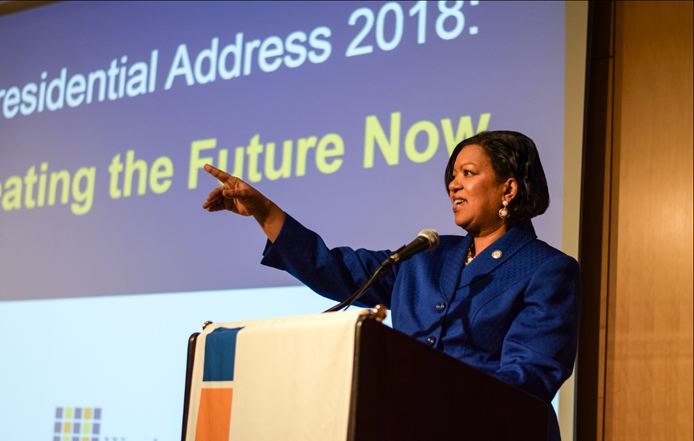Back when she was working as Director of Education for Gainful Employment at Nassau Community College, Belinda Miles created a freshman seminar called “The Practical Application of the Liberal Arts.”
The theme was arguably a stretch for a course funded by the federal Welfare-to-Work program. But for Miles (Ed.D. ’00, M.A. ’88), a first-generation collegian who is now President of Westchester Community College (WCC), the seminar was a characteristic effort to think big about people’s futures – and education itself – by looking beyond the strictly utilitarian.
“I’ve always wanted to marry professional career aspirations to the liberal arts,” says Miles, who is also a staunch supporter of Teachers College’s students through the TC Fund. “We focus so much now on practical careers and the financial value of a college degree, and that’s good – but a liberal arts education does pay off over the course of a lifetime, and it’s critically important for our society. We need the psychology, English and philosophy majors to reimagine our world and the world of work as this century unfolds.”
“We focus so much now on practical careers and the financial value of a college degree, and that’s good – but a liberal arts education does pay off over the course of a lifetime, and it’s critically important for our society.”
— Belinda Miles
Miles has repeatedly reimagined her own career. In 1986, while teaching at a private, for-profit college, she learned from a colleague about the education psychology master’s degree program at TC.
“I wanted to learn about the psychology of learning – about who students are and how to structure curriculum to get them excited. I read up on TC’s wonderful legacy and thought, ‘Gee, can I really go there?’”
At TC, which she attended while holding down a new faculty position at LaGuardia Community College, Miles was inspired by Ernst Rothkopf, the educational psychologist and former Bell Labs scientist, who championed “user-centered” learning. She also crossed paths with a new faculty member, Thomas Bailey, who was looking at how education and training contribute to the economy. After Miles returned to TC to begin a doctorate in higher education organization and leadership development, Bailey created TC’s Community College Research Center, which is now a major partner with Achieving the Dream, a nationwide initiative to prompt community colleges to assess their practices, “face the data,” and take research-based measures to boost what Miles says were then “unacceptable” graduation rates.
“It was an equity issue,” she says. “Community colleges enroll half the nation’s undergraduates and a much higher percentage of low-income students and students of color. Too many students weren’t finishing, which meant we weren’t fulfilling our mission.”
Through TC education psychologist Lee Knefelkamp (since retired), Miles also learned about LEAP – Liberal Education and America’s Promise – an effort by the Association of American Colleges & Universities (AAC&U) to ensure that college graduates emerge with an understanding of human cultures, skills broad enough to meet new problems and challenges, and a commitment to improving society.
Miles channeled both Bailey and Knefelkamp at her next stop: Cleveland’s 48,000-student Cuyahoga Community College, where she eventually rose to become System Provost. On her watch, “Tri-C,” as the institution is known, secured more than $10 million for college readiness, success and completion and was named a two-term Achieving the Dream “Leader College,” charged with mentoring other institutions. Miles also led a $47 million campus expansion while there.
In 2015, Miles became President of WCC, the largest higher education institution in Westchester County. The College has since joined the Achieving the Dream Network and – working with Bailey, CCRC and others – launched a “Guided Pathways” initiative to help students develop clear academic plans. The collaboration with TC has only strengthened Miles’ resolve to contribute to the TC Fund.
“It’s about leading-edge research and faculty commitment to the next generation of researchers and practitioners,” she says. “I’m so proud of my TC credentials. You feel that you’re standing on the shoulders of giants who give us great hope for the future.”
View more Donor Profiles >
